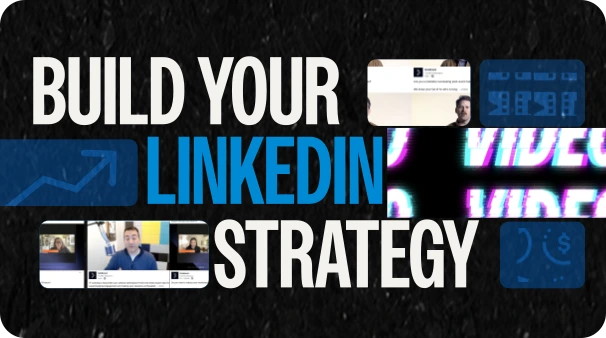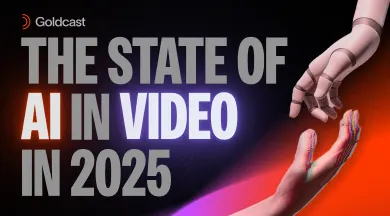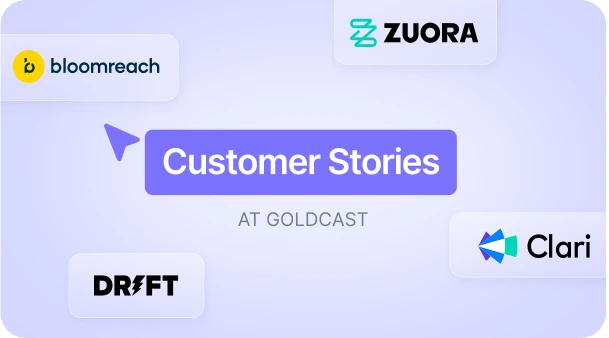How to Use AI in B2B Event Marketing (+7 Tools for the Job)

Maximize Your Marketing ROI
Join 10,000 other marketers already getting the best tips on running engaging events that boost pipeline and create raving fans.
The swift rise of artificial intelligence (AI) has opened up new doors in pretty much every industry and function. Operations, tech, and yes, marketing.
As notorious early adopters, marketers across the globe are now old pros at using ChatGPT to generate blog post drafts and email copy. But sophisticated AI applications have even more to offer.
In virtual event marketing, where innovation is still on fire post-pandemic, marketers have a ton of opportunity to pull ahead of the competition by incorporating AI into their B2B event strategies.
How? We've got all the details.
Let's discuss:
- Benefits of using AI in event workflows
- How to integrate AI into your event workflows
- 7 essential AI tools for event marketing
Benefits of using AI in event workflows
Before we get into specific AI-driven tools and platforms, let's talk a bit about how AI can level up your event marketing strategy.
Improved personalization
In the 2020s, if you're not incorporating advanced personalization tactics into your marketing, it shows. Each of your prospects has their own goals and challenges. Why funnel them all into the same email series?
Instead, you can use AI to analyze your attendee data and personalize the event experience.
Here are some examples of what AI can do to elevate your personalization efforts:
- Recommend speakers and sessions relevant to the attendee's interests
- Create personalized content like email sequences and in-event messaging
Psst: Have you heard about Goldcast's Content Lab? It’s the first AI-powered studio to turn your events into a multi-channel content strategy!
Optimized content
As audiences are more inundated with content than ever, the pressure continues to rise for marketers to create content that's more relevant, helpful, and polished.
Luckily, AI can relieve some of the pressure by helping you create standout virtual event content.
Here's how:
- Analyze past attendee behavior to identify topic trends and high interest levels
- Flag subpar content so you can tweak it or scrap it next time
- Identify users matching your ICP to determine which content they engaged with most
Enhanced lead scoring
Most modern marketers have already said goodbye to manual lead scoring in favor of more sophisticated systems, typically tied into their CRMs. Simple "cold/warm/hot" models are, well, not so hot anymore.
AI can take your automated lead scoring to the next level by:
- Tracking prospects' interactions with your brand on social media
- Aggregating individual engagement across multiple channels
- Prioritizing the most qualified leads based on historical closed/won data

Better and faster event planning
Improving efficiency is one of the most popular use cases for AI. After all, event marketers have the same number of hours in the day as everyone else. You can use AI to take some of the more manual tasks off your to-do list and re-focus on the bigger picture.
Some examples:
- Automating repetitive tasks like data entry and scheduling
- Analyzing event data to identify patterns
- Predicting outcomes like attendance and event ROI
- Automating attendee engagement via social, email, and text messaging (think: seriously smart chatbots 🤖)
How to integrate AI into your event workflows
You're probably already using AI in some of the ways described above. And if not, we hope the examples have gotten your wheels turning.
Here are some quick notes on exactly when and where you can incorporate AI into your existing event workflows to make them better, faster, and stronger. 💪🏻
Pre-event workflow
Every pre-event workflow is different—but most B2B businesses have a process that includes:
- Planning the actual event: scheduling speakers, creating content, and setting up platform logistics
- Event promotion, from social posts, and email campaigns to employee promotion tactics
- Nurturing registrants to optimize attendance: email sequences, sales outreach
AI can enhance all of these areas by automating manual tasks, creating personalized templates for outreach messaging, and engaging with registered attendees before the event to provide the best possible experience.
Post-event workflow
Nailing the post-event follow-up is crucial to getting maximum value from the event you worked hard to pull off.
AI can help with:
- Creating summaries of the event's key points targeted to various audiences
- Repurposing event content to keep the leads and ROI flowing
- Generating social media posts recapping the event (and building a little FOMO for non-attendees)
- Drafting and personalizing follow-up emails for attendees in each segment
- Analyzing data to help you improve future events
The moral of the story is: AI has the potential to improve almost every step of your event process. But it's up to you to figure out where it can make the biggest impact, and which AI tools are the best for the job.
Did you know? Goldcast’s Content Lab can handle all of the bullet points above! Get access now!
7 essential AI tools for event marketers
ChatGPT aside, today there are hundreds of AI-powered tools on the market. Here are some of our favorites for you to consider.
Goldcast
Okay, we’re a little biased here. But honestly, Goldcast is so much more than a tool. It's an AI-driven event marketing platform.
At Goldcast, we understand B2B marketers because we are B2B marketers. And as such, we designed the platform we ourselves would want to use. 🫡
With a heavy focus on bottom-line metrics like conversion rates, pipeline, and revenue, Goldcast helps brands like GitHub and Salesloft run engaging, impactful events. With Goldcast’s Content Lab, you can extend those benefits far beyond your event closing by tapping into the power of AI for repackaging your event content.
Jasper
Jasper is an AI content platform that generates written content, copy, and art. With Jasper, you can quickly create on-brand event descriptions, social content, and email marketing sequences that are mind-bogglingly good.
The platform supports 30+ languages and has specifically been taught digital marketing frameworks for output that nails it every time.
Jasper alternatives
Content generation is one of the most ubiquitous use cases for AI, so there are a ton of platforms in this space. For example, there's Writesonic which focuses on speed to creation, and Anyword which helps marketers tailor messages to their target audience.
Both platforms may be slower to reach ROI, but may offer better usability than Jasper in key areas.
Content Lab
Content Lab is a new tool from Goldcast focused on repackaging event content for maximum impact. Powered by AI, it helps busy marketers turn events into a multi-channel content strategy in minutes, not weeks.
With Content Lab, you can quickly generate highlight reels, SEO-rich blog posts, social content, and post-event emails—all interwoven with the unique, authentic moments that happened during your event.
Content Lab alternatives
Other virtual event platforms are using AI to personalize event content and ideate messages around events. But with its laser focus on automating the event content flywheel by creating multiple formats (including video), Content Lab is truly the first of its kind.
Zapier
Zapier has been a big name since it changed the automation game more than a decade ago. Now, the platform has released beta features combining AI with Zapier's powerful integrations to automate and accelerate your most important work.
What does that mean for users? You can now build automated workflows using plain language—tell Zapier what you want it to do, and consider it done.
Zapier alternatives
While Zapier is still considered the gold standard in integrated automation, there are alternatives that can connect your various apps (say, your event platform to your CRM). G2 users found Integrately easier to use than Zapier, though that could change with the introduction of AI commands.
In terms of notifications and API management, users preferred MuleSoft. You can also look for an event platform that has the most popular integrations, like Salesforce + Slack, built in natively.
HubSpot
Another household name, HubSpot, has also been quick to introduce new features harnessing the power of AI. Its Content Assistant solution helps you write emails, social copy, and blog posts.
Your sales team might be more hyped for the ChatSpot feature, which is an AI chatbot that allows users to accomplish tasks within HubSpot using natural language. For example, you ask ChatSpot, "How many contacts opened XYZ event follow-up email?" without digging through reports.
HubSpot alternatives
Other CRMs, including Zoho and Pipedrive, have introduced features similar to ChatSpot. And Salesforce has doubled down on AI with a feature called Einstein GPT, which helps you with everything from personalization to messaging.
These new AI features may be exciting for marketers already using each respective CRM — but are unlikely to spur anyone to switch CRMs or implement a new one.
Mention
Mention is an AI social listening tool that can help you identify which topics, influencers, and trends matter most to your ICP. If social media is a large part of your event strategy (or you think it could be), it's worth checking out.
You can use Mention to stay on top of current events in your space and ride the waves by creating relevant content.
Mention alternatives
Platforms in the social space often focus on either monitoring, like Mention and Meltwater, or publishing, like Hootsuite. You'll find that while most of the top solutions offer features in both arenas, they typically excel in one or the other.
If monitoring and analysis is your goal, Mention is your tool. But if you're looking to deploy full social campaigns, check out Hootsuite.
Google Analytics
An overwhelming majority of websites use Google Analytics to track and analyze traffic. With the switch to its latest version, GA4, Google introduced its Analytics Intelligence feature. Now, you can ask questions in plain language, browse smart insights, and build audiences with conversion modeling.
What's in it for event marketers? Don't sleep on using Analytics Intelligence to glean deep content and audience insights that inform your next event.
Google Analytics alternatives
Google definitely has the market for web analytics, but the best alternatives depend on your business goals. Plausible is a simple, privacy-friendly analytics platform that might appeal to you if the learning curve for GA4 feels too steep.
In terms of analyzing event performance, your best bet is to look for an event platform that offers robust analytics natively rather than relying on a third-party web analytics platform.
Take AI from theory to practice in your B2B event strategy
In the past couple of years, a ton of game-changing tools and tactics have become available for B2B event marketers who want to stay on the cutting edge of AI. From personalizing customer experiences to automating content creation, the possibilities are endless—and a bit overwhelming.
If you want an easy place to start, sign up to the Content Lab today to try it out! Get more out of your events by creating always-on, easily consumable content— in minutes, not weeks.

Stay In Touch
Platform
Resources
Company
Community
© 2025 Copyright Goldcast, Inc. All rights reserved.



 Upcoming Events
Upcoming Events Event Series
Event Series On-Demand Events
On-Demand Events

